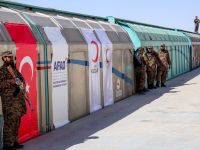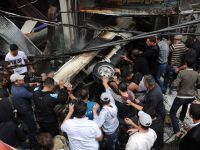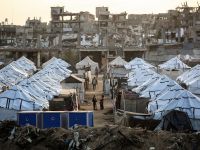Israeli anti-terrorist units helped train a hit squad used to assassinate enemies of Nigeria's late military ruler Sani Abacha, a hearing was told Thursday.
Former army sergeant Barnabas 'Rogers' Mshelia told a public hearing of the Nigerian human rights panel he was a member of the squad known as 'Strike Force'.
"We were trained by the Israelis in anti-terrorist activities," he said, without providing details.
The squad was also trained at secret camps in North Korea, Mshelia said.
The self-confessed hitman is the chief prosecution witness in one of two murder trials of Abacha's powerful chief of personal security, Major Hamza al-Mustapha.
Al-Mustapha acknowledged Wednesday he had been in charge of 17 separate security units based at the presidency during the 1993-1998 Abacha regime.
Mshelia admitted Thursday taking part in political killings, saying it was on al-Mustapha's orders.
"I killed Kudiratu Abiola. I was involved in assassination attempts on Dr. Alex Ibru and Abraham Adesanya," he said.
Abiola, the wife of late detained politician Moshood Abiola, was shot dead on a Lagos street in 1996. An assassination attempt was made the same year against Ibru, a newspaper publisher and former minister.
Adesanya is a prominent southern politician who was also alleged to have suffered an assassination attempt.
Mshelia said it was not surprising al-Mustapha was denying his role.
"I am not surprised that Mustapha is refusing to accept his responsibility. It takes more than the spirit of an ordinary man to take such a responsibility," he said.
Al-Mustapha has denied in court having responsibility for any killings but in previous hearings of the human rights panel he has admitted to ordering one prisoner to be tortured.
Mshelia dismissed the major's denials.
"I would not undertake any assignment without the order of Mustapha," he said. "Mustapha had the power to assign anybody in the security department to go on any assignment including killing," he said.
Abacha's former number two, Oladipo Diya, told the panel Wednesday al-Mustapha had been more powerful than Abacha.
"Officially, I was number two but in reality, al-Mustapha was number one," he said.
Shedding tears, Mshelia said he had carried out killings because he believed they were for the good of Nigeria, but now believed this was wrong.
"When I was working I did not regret it because I believed I was working for my country," he said.
Earlier, the chairman of the panel, set up last year to investigate human rights abuses in Nigeria dating back to 1966, announced it would extend its sittings in Lagos to the end of next week.
Justice Chukwudifu Oputa said four weeks of hearings in Lagos were insufficient to cover the cases brought before the panel.
"We are happy to extend the Lagos sitting for another one week to enable us to clear all the backlog of cases," he said.
The panel held two weeks of sittings in Abuja in October and had scheduled four weeks in Lagos to be followed by two weeks each in the cities of Port Harcourt, Enugu and Kano -- LAGOS (AFP)
© 2000 Al Bawaba (www.albawaba.com)







